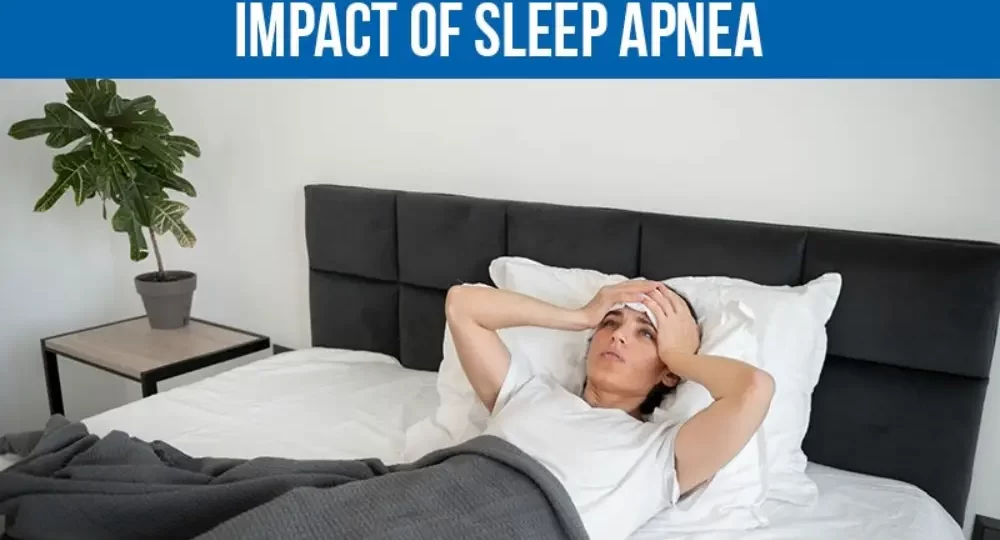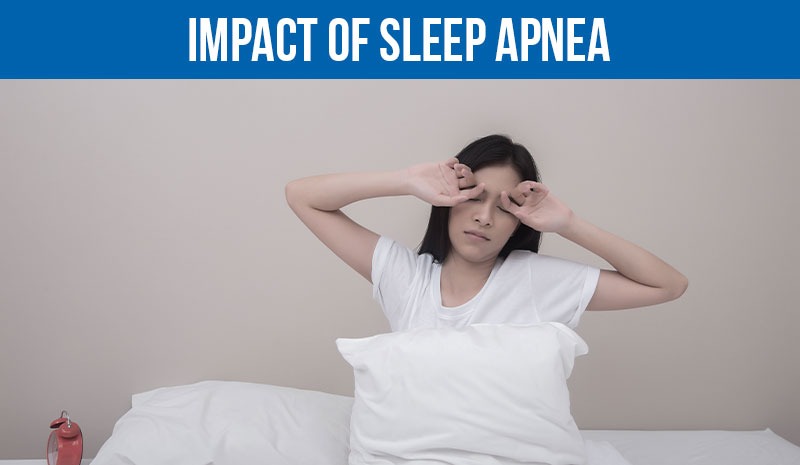
This sleep disorder is far from just a loud snore or waking up feeling groggy in the morning. Instead, it’s a silent attack on your health, emotions, and productivity. If untreated, this is one of the most common sleep disorders that would drastically change the quality of life. But what is sleep apnea, really, and what does it have to do with you beyond the bedroom?
In this article, we will talk about the effects of sleep apnea on your daily life the physical toll and the influence on your mood and productivity, we will break down why addressing this condition is important. If you or someone you know is living with untreated sleep apnea, keep reading to understand how taking action can make a world of difference.
What Is Sleep Apnea?
Sleep apnea is a sleep disorder characterized by repeated stops and starts of breathing during sleep. These pauses range from a few seconds to minutes and occur multiple times per hour, causing your body to miss much-needed oxygen.
The three main forms of sleep apnea are categorized as follows:
Obstructive Sleep Apnea (OSA): Caused by the relaxation of throat muscles, which causes the airway to be blocked.
Central Sleep Apnea: Central sleep apnea is the failure of the brain to send the right signals toward the muscles for breathing.
Complex Sleep Apnea: This is the combination of obstructive and central sleep apnea.
Common symptoms include:
- Loud snoring.
- Gasping for air during sleep.
- Morning headaches and dry mouth.
- Excessive daytime sleepiness.
- Difficulty concentrating or remembering things.
Physical Health Impact of Sleep Apnea
Untreated sleep apnea has one of the most frightening outcomes impact on physical health. Chronic sleep disruptions can strain almost every system in your body.
1. Cardiovascular Problems
Sleep apnea increases the chance of severe cardiovascular diseases. Every time your body experiences a dip in oxygen during sleep, your body responds with the release of stress hormones. This causes the blood pressure to rise. If this continues, it may eventually cause:
- High blood pressure
- Heart attacks
- Irregular heartbeats (arrhythmias).
- Strokes
2. Association with Obesity and Diabetes
Obesity is commonly associated with sleep apnea. Sleep disturbance disrupts hormones that are used to control hunger, making one hungry for bad foods. Furthermore, sleep deprivation has been linked to insulin resistance, a precursor to Type 2 diabetes.
3. Low Energy and Physical Stamina
You wake up drained if your body doesn’t get restorative sleep. It will make it tougher to stay active, exercise, or get through the daily tasks at hand.
![Impact of Sleep Apnea]() Emotional and Mental Impact
Emotional and Mental Impact
1. Mood swings and irritability.
Sleep apnea can generally lead to sleep deprivation, increasing the risk of having mood swings, irritability, and even anger. One may lash out at their loved ones or have little aggravations.
2. Depression and Anxiety Effects
Untreated sleep apnea strongly correlates with depression. Chronic consequences include fatigue, loss of focus, and patterns of disorganized sleep, over time potentially progressing to hopelessness and anxiety.
3. Cognitive Decline
Having trouble concentrating, forgetting the simplest things, or getting brain fog? It’s because sleep apnea lessens the supply of oxygen to the brain. This can even impair cognitive functioning. If not treated, it may influence judgment problem-solving capacity, and the capacity to learn new things.
Workplace and Social Impact
1. Poor Productivity
Daytime drowsiness and lack of concentration make it challenging to work. Deadlines become too much to handle, and tasks that were once easy become impossible.
2. Risk of Accidents at Work
If you are a driver or operate heavy machinery, the risk of accidents increases with sleep apnea. According to studies, people who have untreated sleep apnea are more likely to experience drowsy driving incidents.
3. Strain on Relationships
Your loved ones might notice the effects of your sleep apnea before you do. Snoring loudly, mood swings, or fatigue may be a cause of tension in your relationships. Some couples even sleep in separate rooms, which may further affect intimacy.
Long-Term Risks of Untreated Sleep Apnea
1. Chronic diseases
Untreated sleep apnea also increases your risk of chronic diseases such as diabetes, heart disease, and stroke. Such diseases significantly affect your quality of life and cause increased medical expenses.
2. Reduced Life Expectancy
The research findings suggest that untreated sleep apnea patients are at a higher risk of mortality compared to the ones who get treatment. The body needs rest for repair processes, and in its absence, the total effects become deadly.
How to Address Sleep Apnea
1. Recognizing the Symptoms
Most importantly, acknowledge the symptoms. If you or a loved one snores extremely loudly, often finds themselves tired in the middle of the day or wakes gasping for air, see a healthcare professional.
2. Diagnosis
Sleep studies either in a clinic or at home will affirm the diagnosis of sleep apnea and establish its severity.
3. Treatment Choices
CPAP Machines: The most common treatment is a continuous positive airway pressure (CPAP) machine, which keeps your airway open, allowing for uninterrupted sleep.
Lifestyle Changes: Losing weight, avoiding alcohol before bedtime, and sleeping on your side can reduce symptoms.
Surgery: In severe cases, surgical options may be explored to address structural issues causing airway blockage.
4. Benefits of Treatment
Treatment of sleep apnea can lead to:
- Better quality of sleep.
- Improved mood and cognitive function.
- Lower health risks with more energy.


 Emotional and Mental Impact
Emotional and Mental Impact














